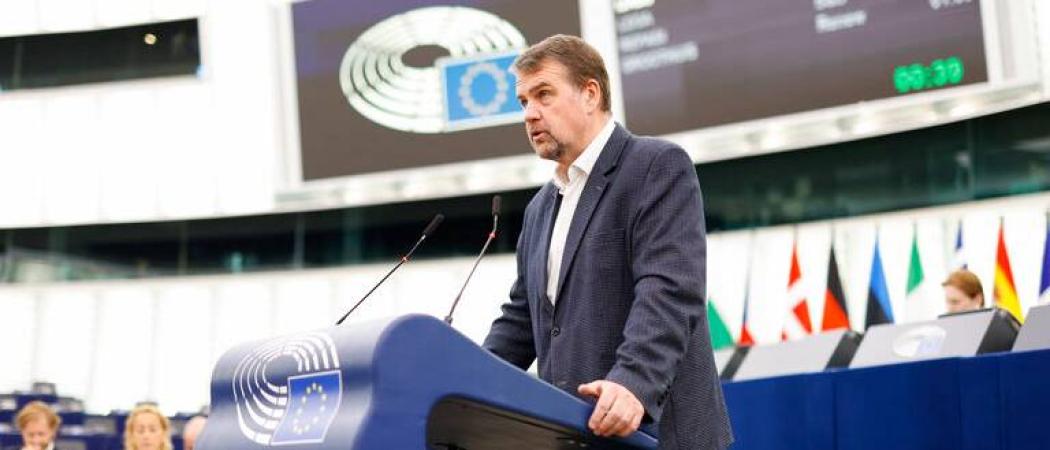Faced with multiple crises and budgetary constraints, EU member states may be increasingly reluctant to fund cross-border cooperation in research, says Ivars Ijabs MEP

Latvian MEP Ivars Ījabs. Photo: Mathieu Cugnot / EP / European Union 2022
With a war going on near its eastern border, and as it grapples with rising inflation, slowing economic growth and energy shortages, the EU is preparing to hone its multiannual budget to fit these new circumstances.
Latvian MEP Ivars Ijabs fears financial troubles ahead could have a significant impact on the future of EU research and innovation programmes. “What worries me right now is of course the future of Horizon [Europe] itself,” he said.
In an interview with Science|Business, Ijabs, a member of the European Parliament’s research and industry committee, ITRE, said next year’s budget review will take into account the financial effort needed to help Ukraine in the war with Russia. That means EU expenditure will have to be adapted to fit these new realities.
Last week, the Parliament voted through a list of demands for this upcoming budget review, asking the European Commission to stop funds meant for research from being diverted to address emerging issues. MEPs are also unhappy with the Council’s refusal to allow unspent research money to be rolled back into the Horizon Europe budget.
Last month, EU ministers refused to allow €400 million in unspent Horizon money to go into Chips for Europe, a €3.3 billion package for the research, development and manufacturing of advanced microchips.
As a further sign of the pressures on R&D funding, during the negotiations for the 2023 budget, Parliament had to fend off attempts by the member states to cut EU’s budget for research and innovation.
“I think that the broader picture doesn't look very, very good,” said Ijabs. “I am scared a little bit that member states which have not been investing much in research and innovation anyway, wouldn’t bother investing in [Horizon] because the budget is going to be extremely scarce.”
MEPs say new initiatives must get fresh funding, instead of piggybacking existing programmes, such as Horizon Europe. That includes Chips for Europe and the New European Bauhaus cultural innovation initiative, for which the Parliament wants €500 million in fresh money. Other demands include a €60 million a year fellowship scheme for researchers at risk.
Given this, the budget tussle between Brussels and EU capitals is likely to continue, and EU institutions will need to look for another way to fund microchip R&D. “To shut the whole thing down because of the [budget issue] would be a very bad signal for the European tech sector because that means EU initiatives on such strategic issues are not reliable,” Ijabs said.
Maintaining pandemic momentum
While the research community has been able to use the COVID-19 pandemic to make a solid case for the value of public research funding, there is an evident risk that governments will revert to the old habit of reducing R&D expenditure in times of economic crisis.
Ijabs says poorer member states might be more vulnerable to this kind of thinking, despite the fact that many countries in central and eastern Europe are working on making their research and innovation systems better funded and more competitive.
However, member states are still not positioned to draw on all the funding that is potentially available from Horizon Europe and EU structural funds, to continue investing in research and innovation. A recent report by the European Court of Auditors found that despite some progress, member states have a difficult time pooling Horizon and cohesion funds to invest in their science sectors.
“Coming from a country where [R&D] has been underfunded for many years, I think that every euro cent from the structural funds spent on research and innovation is a good thing,” Ijabs said.
However there are many bureaucratic challenges in making Horizon Europe and cohesion funds work together. “There is very little interoperability,” said Ijabs. “To my mind, this is an issue that has to be solved in the member states.”
As for his home country Latvia, Ijabs says there are some pockets of excellence in quantum mechanics, biochemistry and machine learning, but overall, the research and innovation sector has seen 20 years of neglect.
He would like to see R&D policy responsibilities being transferred to an institution independent of the education ministry, which is often more preoccupied with primary and secondary education and less so with universities.
The Latvian higher education system “has not experienced any serious reforms since the Soviet era,” Ijabs said. “Without having decent university reform, it's hard to imagine a decent reform of the R&D system.”
For Europe as a whole, EU governments should try to keep the political momentum going, said Ijabs. “If you want to really have a competitive innovation system, which will bring your country much economic benefit, it won't happen in a few months, it's going to take years.”





 A unique international forum for public research organisations and companies to connect their external engagement with strategic interests around their R&D system.
A unique international forum for public research organisations and companies to connect their external engagement with strategic interests around their R&D system.